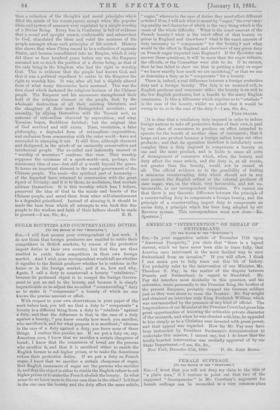SUGAR BOUNTIES AND COUNTERVAILING DUTIES. (To THE EDITOR OF THE
"EPEOTATOD.."1 SIR, -I will first answer your correspondent of last week. I do not think that foreign producers are enabled to outdo their competitors in British markets, by reason of the protective import duties in their own country, but that they are thus enabled to outdo their competitors in their own foreign market. And I wish your correspondent would tell me whether it signifies to the British producer whether he is outdone in the home- or in the foreign market; and if so, how and why. Again, I call a duty to countervail a bounty "retaliatory," because its professed object is to compel the foreign Govern-
ment to put an end to the bounty, and because it is simply impracticable so to adjust the so-called " countervailing " duty as to make it " compensate " a bounty of which no one knows the precise amount or effect.
With respect to your own observations in your paper of the week before last, you tell me that a duty to " compensate " a bounty is a different thing from a duty to " retaliate " against a duty, and that the difference is that in the case of a duty against a bounty, " you know exactly how much you sacrifice, who sacrifices it, and for what purpose it is sacrificed ;" whereas in the case of a duty against a duty, you know none of these things. I confess this puzzles me. If we put a duty on, say, American corn, I know that we sacrifice a certain cheapness of bread; I know that the consumers of bread are the persons who sacrifice it, and that it is sacrificed either to enable the English farmer to ask higher prices, or to make the Americans reduce their protective duties. If we put a duty on French sugar, I know that we sacrifice a certain cheapness of sugar, that English consumers of sugar are the persons who sacrifice it, and that the object is either to enable the English refiner to ask higher prices or to make the French abolish the bounty. In what sense do we know more in the one case than in the other ? Is it that in the one case the bounty and the duty affect the same article,
" sugar," whereas iu the case of duties they must affect different articles P If so, I will ask what is meant by "sugar," the ever vary. ing quality and character of which is the very thing which is the cause of the whole difficulty. What is the exact amount of the French bounty P what is the exact effect of that bounty on prices in England and elsewhere ? what is the exact amount of duty necessary to " compensate" for the bounty P and what would be the effect in England and elsewhere of any given duty on French sugar imported into England ? If the Spectator can answer these questions, it will be more than the sugar refiners, the officials, or the Committee were able to do. If he cannot, then he has failed to show me that in putting a duty on sugar "we know exactly how much we are sacrificing," or that we can so determine a duty as to " compensate " for a bounty.
There is, indeed, a real difference between a foreign protective duty and a foreign bounty. The duty is an unmixed evil, to English producer and consumer alike ; the bounty is an evil to the few English producers, but a benefit to the many English consumers, Is this a difference which requires us to " retaliate " in the case of the bounty, whilst we admit that it would be wrong to do so in the case of the duty ?—I am, Sir, &c., FREE-TRADER.
[It is clear that a retaliatory duty imposed in order to induce foreign nations to take off protective duties of their own, is paid by one class of consumers to produce an effect intended to operate for the benefit of another class of consumers ; that it keeps out one product because a foreign nation keeps out other products ; and that its operation therefore is indefinitely more complex than a duty imposed to compensate a bounty on one and the same product, and is liable to cause all sorts of derangement of commerce which, when the bounty and duty affect the same article, and the duty is, at all events, not greater than the bounty, would not be caused at all. The official evidence as to the possibility of finding a minimum countervailing duty which should not in any case protect the English refiner or the colonial producer of cane sugar, was, on the whole, very favourable, and not un- favourable, as our correspondent intimates. We cannot see that there is any theoretic difference between the principle of a countervailing duty to compensate a foreign bounty, and the principle of a countervailing import duty to compensate an excise duty, a principle which has been long adopted by our Revenue system. This correspondence must now close.—En. Spectator.]


































 Previous page
Previous page